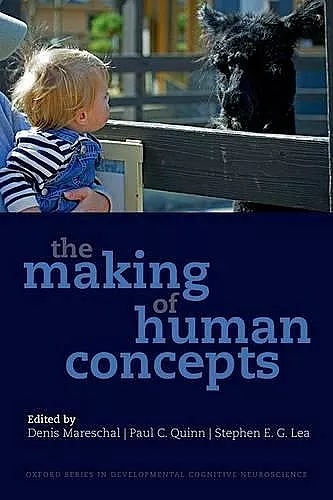The Making of Human Concepts
Paul Quinn editor Stephen EG Lea editor Denis Mareschal editor
Format:Paperback
Publisher:Oxford University Press
Published:14th Jan '10
Currently unavailable, and unfortunately no date known when it will be back

Human adults appear different from other animals in their ability to form abstract mental representations that go beyond perceptual similarity. In short, they can conceptualize the world. This apparent uniqueness leads to an immediate puzzle: WHEN and HOW does this abstract system come into being? To answer this question we need to explore the origins of adult concepts, both developmentally and phylogenetically; When does the developing child acquire the ability to use abstract concepts? Does the transition occur around 2 years, with the onset of symbolic representation and language? Or, is it independent of the emergence of language? When in evolutionary history did an abstract representational system emerge? Is there something unique about the human brain? How would a computational system operating on the basis of perceptual associations develop into a system operating on the basis of abstract relations? Is this ability present in other species, but masked by their inability to verbalise abstractions? Perhaps the very notion of concepts is empty and should be done away with altogether. This book tackles the age-old puzzle of what might be unique about human concepts. Intuitively, we have a sense that our thoughts are somehow different from those of animals and young children such as infants. Yet, if true, this raises the question of where and how this uniqueness arises. What are the factors that have played out during the life course of the individual and over the evolution of humans that have contributed to the emergence of this apparently unique ability? This volume brings together a collection of world specialists who have grappled with these questions from different perspectives to try to resolve the issue. It includes contributions from leading psychologists, neuroscientists, child and infant specialists, and animal cognition specialists. Taken together, this story leads to the idea that there is no unique ingredient in the emergence of human concepts, but rather a powerful and potentially unique mix of biological abilities and personal and social history that has led to where the human mind now stands. A 'must-read' for students and researchers in the cognitive sciences.
To a large extent cognitive, developmental, and comparative psychologists have pursued the study of concepts independently, with little attempt at integration between these disciplines. In this important edited collection, contributions from the leading experts detail the phylogenetic and ontogenetic origins of human adult concepts and push towards a coherent overall perspective. The volume will be essential reading for students, academics, and researchers seeking a unitary perspective on the origin of human adult concepts * Professor Mark H. Johnson, Director, Centre for Brain and Cognitive Development,University of London *
This book focuses on a provocative question: what, if anything, is unique about human concepts? The authors-leaders in cognitive, developmental, and comparative psychology- provide an important push towards integration of disparate perspectives. Although it is difficult enough to study any one of these areas, the combination of the different disciplines provides a different outlook on the possible influences of relations, language, culture, and evolution. This is a stimulating, accessible, edited volume that will help students and researchers to better understand the question and the possible answers * Professor Brian H. Ross, Department of Psychology, University of Illinois *
This edited volume is an exceptional delight to read. It is a thoughtful and compelling collection of chapters from today's top scientists examining human categorization from a wide variety of theoretical and comparative perspectives. Individuals from any number of areas should find this diverse material extremely interesting and important in advancing their understanding of this fundamental and important aspect of cognition. Beyond selecting an outstanding group of authors, the editors have thoughtfully provided the scientific foundations for the chapters and, more importantly, included an integrative summary that brings the different perspectives included in this volume into a common interdisciplinary focus. In sum, this volume is an important advance and is highly recommended for all interested in the fundamental nature of human and non-human thought * Professor Robert Cook, Avian Visual Cognition Lab, Department of Psychology, Tufts University *
ISBN: 9780199549221
Dimensions: 233mm x 156mm x 23mm
Weight: 623g
416 pages